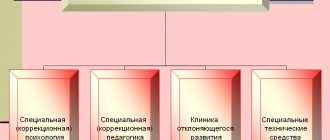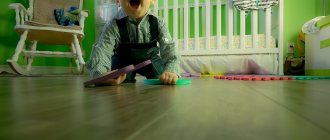DEVELOPMENT OF IMITATION
Imitation is one of the main ways a young child assimilates social experience. In this way, he learns everyday skills and masters speech. But imitation itself does not develop in a child right away; it requires teaching influence from an adult. Teaching a special child to imitate is one of the most important tasks of primary education, since special education imitation develops extremely slowly, which affects the acquisition of the practical skills necessary for the child.
Imitation is the repetition of an adult’s movements or his actions with objects that occur in full view of the child. The adult shows and the child repeats.
It is easier for a child to imitate movements than actions with objects. It cannot accurately reproduce the direction of movement and its scope. Moreover, it is difficult for him to reproduce an action with an object, which often consists of several successive stages. For example, to feed a doll, you need to take a spoon and hold it by the handle, bring it to the plate, then to the doll’s face, etc. A child will not be able to follow the order of operations in this complex action if it is performed by an adult quickly and without highlighting each stage. Therefore, the demonstration should be carried out slowly, with the recording of one or another moment and indicated by a word.
If the child does not imitate a given movement or action with an object, the adult should take his hands in his own and jointly perform the desired action, and then offer to repeat it himself by imitation.
"Birds"
Goal.
Teach a child to imitate the actions of an adult, develop emotional contact between an adult and a child.
Progress of the game.
The adult invites the child to come to him. "Do as I do. Let's fly like birds." - he says and raises his arms to the sides, waves them, runs around the room, dragging the child with him. Then he says: “The birds are pecking the grains.” (They squat down.) Do this.” (Knocks his hand on the floor.) The child repeats. The game is repeated 2-3 times. If the child does not repeat the actions on his own, then the adult takes his hands in his own and performs the movements together with the child “hand in hand.”
"Roll the ball"
Target.
Teach the child to imitate the actions of an adult with an object.
Progress of the game.
The adult sits at one end of the table, the child at the other. The adult places a collar between himself and the child, takes
the ball and says: “Do as I do,” rolls it through the goal to the child. He must roll the ball back.
Consultation “8 simple tips from a speech pathologist for parents”
Kristina Krasnoyaruzhskaya
Consultation “8 simple tips from a speech pathologist for parents”
8 simple advice from a speech pathologist to parents
• Talk to your child. The child understands the spoken speech better if it describes what is happening around the event. Therefore, it is necessary to accompany your actions with words.
• Voice the situation, but only if the child sees and hears you. Don't talk into emptiness, look into his eyes. This is especially important if your child is overly active. If the child speaks poorly and speaks little, try to let him see your articulation. Naturally, you need to speak clearly!
• Don't use too long phrases. Do not overload your child by offering him several unfamiliar words at once.
• If you see a child touching something or playing with someone, name this object briefly and clearly several times.
• Support your child's desire to interact with you. In those moments when you talk to him, exclude other irritants (loud music, TV sounds)
and give your child the opportunity to hear you and himself.
• Many parents try to guess the wishes of their silent child. In such situations, the child does not need to say anything, just a gesture is enough. Gesture is also communication, but you shouldn’t stop at this level.
• Specially create play situations in which the child needs to answer your questions and ask them himself. Develop and stimulate dialogue.
• Don't forget to enjoy your child's successes, even the smallest ones at first. Talk about how great he is.
How to spend a day off with your children?
A day off is a day for rest, for communicating with children. Give your children an interesting day out. Let it become a tradition, to make it interesting and exciting, let’s use a few ideas.
1. Get creative!
Come up with an applique craft with your child. Remember the famous origami. Or you can simply sew a dress or skirt for the doll. Or make a robot out of matchboxes.
2. Draw!
Ask your child to draw a family. I think you will be delighted by the flight of his imagination!
3. Board games
For learning to count, I highly recommend the game “shop”
. If you learn numbers in a game situation, it will all go faster and more fun.
4. Read a book or watch a good children's movie together (and be sure to discuss it with him)
.
5. Organize a cleanup day.
I’m sure that the neighbor’s kids will be happy to join in the game of who can collect the most leaves or snow in the yard.
What to do in winter? We can build a snow slide together. Or fill the skating rink.
6. Dough modeling for children
Dough modeling for children is no less exciting. Salty dough is quite pleasant to the touch, and most importantly, it is a completely natural material for modeling. You need to do it at home yourself. To do this, mix 1 glass of flour and a glass of fine salt, and then add a glass of hot water. You can add food coloring. You will have to spend a little time, but this dough can be stored for 2 weeks in the refrigerator.
7. Finger Theater
Children of senior preschool age enjoy playing finger theater, creating interesting performances based on their favorite fairy tales. Finger puppets can be made from any available materials. You can even draw the characters' faces directly on your fingers. Playing puppet theater not only develops fine motor skills in children, but also affects their diction and artistry.
8. Household duties
Be sure to assign your child homework. The child's household responsibilities will help raise a collected and responsible person. But the child must also see that in response to his efforts, you also make your efforts. It will be very useful for the child to learn responsibility. A child's responsibilities don't have to be complicated. But as he grows and develops, he can be entrusted with more and more responsible activities. Such trust on your part will make the child happy, and the relationships in your family close and friendly.
No matter how you decide to spend your day off, the most important thing is that your whole family will be together all day and this will only have a positive effect on the family climate
Documents for the work of a teacher-defectologist
In accordance with the Law of the Russian Federation “On Education”, with the “Concept of the Rights of the Child” and the “World Declaration on the Survival, Protection and Development of Children”, every child must be guaranteed the right to development, upbringing, education, taking into account his individual capabilities. The provisions reflected in these documents apply to all children, including children with intellectual disabilities. They provide legal protection of childhood, support for the family as the natural environment of a child’s life, health care, ensuring the upbringing, development and education of children, support for those who most need it.
This work program is of a correctional and developmental nature. The work program defines the main directions of work of a teacher-defectologist, the conditions and means of forming correction, development and prevention of disorders.
The regulatory basis for the development of the work program is: 1. “Law on Education of the Russian Federation” (July 10, 1992 N 3266-1 as amended on December 27, 2009 N 374-FZ); 2. FGT to the structure of the basic general education program of preschool education (approved by order of the Ministry of Education and Science of the Russian Federation dated November 23, 2009 No. 655, Registration No. 16299 dated February 8, 2010 of the Ministry of Justice of the Russian Federation); 3. FGT to the conditions for the implementation of the basic general education program of preschool education (approved by Order of the Ministry of Education and Science of the Russian Federation dated July 20, 2011 No. 2151, registration No. 22303 dated November 14, 2011 by the Ministry of Justice of the Russian Federation); 4. Model Regulations on a preschool educational institution (Order of the Ministry of Education and Science of the Russian Federation dated October 27, 2011 No. 2562); 5. Letters of the Ministry of Education of the Russian Federation dated 09/04/1997 No. 48 “On the specifics of the activities of special correctional educational institutions of types I – VIII” as amended on 12/26/2000 6. SanPiN 2.4.1.2660-10 “Sanitary and epidemiological requirements for the structure, content and organizing the work regime in preschool organizations" (Resolution of the Chief State Sanitary Doctor of the Russian Federation dated July 22, 2010 N 91) 7. Changes No. 1 to SanPiN 2.4.1.2660 - 10 "Sanitary and epidemiological requirements for the design, content and organization of the work regime in preschool organizations." Resolution of the Chief State Sanitary Doctor of the Russian Federation dated December 20, 2010 No. 164 “Sanitary and Epidemiological Rules and Standards” SanPiN 2.4.1. 2791 -10 8. Charter of an educational institution
Slowly thinks. Poor understanding of cause and effect relationships
The normal development of a child directly depends on the experience gained. When parents develop a child, telling him how the world works and the reasons for certain actions - broadening his horizons, and then giving feasible tasks, the child gains experience and develops thinking.
To establish cause-and-effect relationships, the child constantly asks questions and is interested in everything in the world. By the age of four, a child can calmly answer simple questions: how was your day? What did you do in kindergarten? Did you like drawing? The child will be able to construct a detailed sentence.
Help is needed if:
- a child throws tantrums when faced with a situation or question he does not understand
- during classes or games, with old instructions, but new objects, does not understand what needs to be done. Have to re-explain the rules
- doesn't answer questions well
- the child is nervous and cannot express his emotions
- When giving a task to a child, a pause is required for the child to realize and understand the task. And also repeating the same thing several times, because most of the information will “fly past the ears”
- the child constantly asks for help, does not want to show independence
Disobeys rules, throws a tantrum
After two years, a child who develops normally begins to develop volitional behavior. To achieve certain goals, the child overcomes obstacles and performs certain actions. The development of such qualities directly depends on the reaction of adults.
If they constantly teach the child rules and norms of behavior, then the child grows up obedient, knows how to wait, obey, and follow the regime. He will grow up sociable, inquisitive and calm.
It is worth paying attention and asking for help from a specialist if:
- the child achieves his goal by shouting for a long time
- can't wait
- parents cannot teach their child to follow a routine
- the child does not obey the rules
- the child fails, he immediately loses interest and gives up what he started
- the child protests whenever his parents try to involve him in completing a task: he screams, throws objects, falls to the floor, strains or relaxes the muscles of the whole body
How are classes conducted?
— First, I examine the child and identify speech disorders. Next, I determine a plan for corrective work with a specific patient,” explained I. Kunevich.
The teacher’s arsenal includes many interesting aids, innovative developments for the development of articulatory and fine motor skills, breathing and finger exercises, playbooks for stimulating speech development, aids for correcting writing and reading in primary school students.
“Secondly, I try to consult parents in detail and, if necessary, conduct a training session with them. In such classes, the mother sits next to the child and watches (sometimes documents) how I work with the baby. At the end of the lesson I tell you what I did and why. There were many cases when, examining a child’s articulatory apparatus, I could immediately make a sound, and everyone left happy. But only for inorganic disorders,” shared I. Kunevich.
The child is “in his own world”
At an early and preschool age, a child can get so carried away by some kind of game or activity that he can disconnect from the world around him. And this is normal, as long as it can be switched to something else by barely touching or talking to it.
Don't miss: How to set and fix the sound K and Kь
You should definitely contact a specialist if:
- the child does not respond well to touch
- You can’t reach your child while you’re busy with something
- Only toys that sound, move, or light up attract interest.
- the child constantly plays the same monotonous games: throwing toys, running around the apartment, spinning, arranging objects in a row. When adults try to switch, he begins to get nervous and tries to return to his game again
- the child is not interested in what is happening around him
- the baby does not imitate adult activities
Difficulty moving
With normal development, the child constantly moves, jumps, runs, and requires attention. And that’s right - energy requires an outlet. Then the child gets tired and sits down to play quiet games. Over time, he learns independence and behavioral norms (you can’t shout in public places, overturn furniture, distract adults if they are very busy, etc.).
You need specialist help if:
- The child moves without interruption and does not experience fatigue. Doesn't sleep during the day, and when he goes to bed at night, he throws scandals and hysterics
- The child's body is in constant motion and cannot sit still. The child waves his arms and legs all the time. Attempts to make him sit down and occupy him with quiet games turn into another scandal.
It is worth paying attention if the child does not move well in space - he bumps into or touches, or knocks over furniture.
- When asked to put away the toys, he throws a tantrum and runs away. In this case, there is increased muscle tone and a constant excited state of the child’s brain (the brain requires constant movement, otherwise nerve impulses will stop flowing to its different parts).
Don't miss: Complex defects in children
Refuses to speak or speaks “in his own language”
The child learns speech on the basis of role-playing, story games, and various types of cognitive activities. By the age of three, a child has approximately formed a vocabulary of 700-1000 words. Even with normal development, a child can confuse endings and gender. But by the age of 5-6, these errors gradually disappear.
It is worth contacting a defectologist if:
- the child refuses to speak. When asked to repeat a word or phrase, he begins to play around, act up, or switch to something else.
- cannot repeat the movements of the tongue and lips after an adult - problems with the articulatory apparatus. The child “speaks his own language”
- the child uses only one word when communicating
- speaks in memorized phrases, does not know in which situation to say which words
- has trouble remembering new words
Don't miss: How to motivate your child
What is the work of a children's speech pathologist?
Teacher-defectologist I. Kunevich works with patients in the age group from 1 to 18 years.
“My main tasks are primary and preventive appointments, diagnostics, advisory and correctional classes,” said the specialist. — The latter implies not only the production of sounds, but also the development of all components of the speech system: vocabulary, grammatical structure of speech, articulatory and fine motor skills, prosody, coherent speech, development of visual and auditory attention, perception, memory, thinking, sound analysis and synthesis of words .







